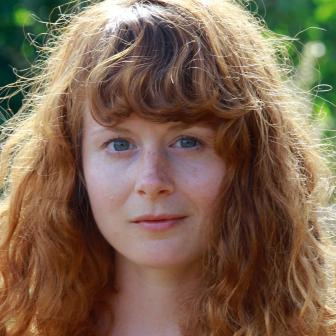Maartje Smits

Maartje Smits
Maartje Smits has proved that, even though there have been no avant-garde movements in the Netherlands for a long time, innovation in poetry is still possible on an individual level. Smits (born in Soest) studied at the Rietveld School of Art & Design and completed her master’s in Design at the Sandberg Institute.
Her first collection Als je een meisje bent (If You Are A Girl), a musical, playful and highly feminist book, was published in 2015. It was followed two years later by Hoe ik een bos begon in mijn badkamer (How I Started a Forest in my Bathroom), in which Smits, influenced by American writer Juliana Spahr and French philosopher Bruno Latour, reveals herself as one of the first Dutch poets with a deep ecological awareness. She also experiments with the use of chat bots and AI to generate poetic texts and support her performances. Smits, who is a beekeeper herself, is currently writing a prose book on bees, and also works as a lecturer at the Rietveld Academy and the ArtEZ Institute of the Arts in Arnhem.
In the ‘girl universe’ of her first collection, for instance, Smits demonstrates how a mixture of feminism, multilingualism, digital culture, telephony and a very sharp ear for language and rhythm can result in beautiful and highly original poetry. The way in which Smits lets her poems break free from the Dutch by peppering them with German, English and French words is becoming something of a trademark for her. Skilfully interweaving digital and ‘analogue’ experiences, the poem ‘A Blank Text’ reads
I was in move mode
followed by ein
pulsing blue dot
past street lines lauwe
roads lights kanal
strips out of die Stadt.
Digital culture also features in Hoe ik een bos begon in mijn badkamer, a collection in which text and photography interact. In her latest poems, which have deservedly been called ecopoetry, Smits draws attention to the question of what nature is and how humans relate to the environment. She also has a keen eye for human influence on Dutch landscape and for climate change, which has become an ominous reality in recent years. In ‘De laatste mens’ (The Last Human) she writes
this is no place to go extinct
the last human draws boundaries in the sand
to feel more at home / she knows all the animals’ names and other
terms that have fallen into disuse.
It would be safe to say that, four decades after its invention by the French writer Françoise d’Eaubonne, ecofeminism has finally reached Dutch poetry. Thanks to Maartje Smits.
Bibliography
Poetry
Als Je een Meisje Bent, De Harmonie, Amsterdam, 2015
Hoe Ik een Bos Begon in Mijn Badkamer, De Harmonie, Amsterdam, 2017
Sponsors
























